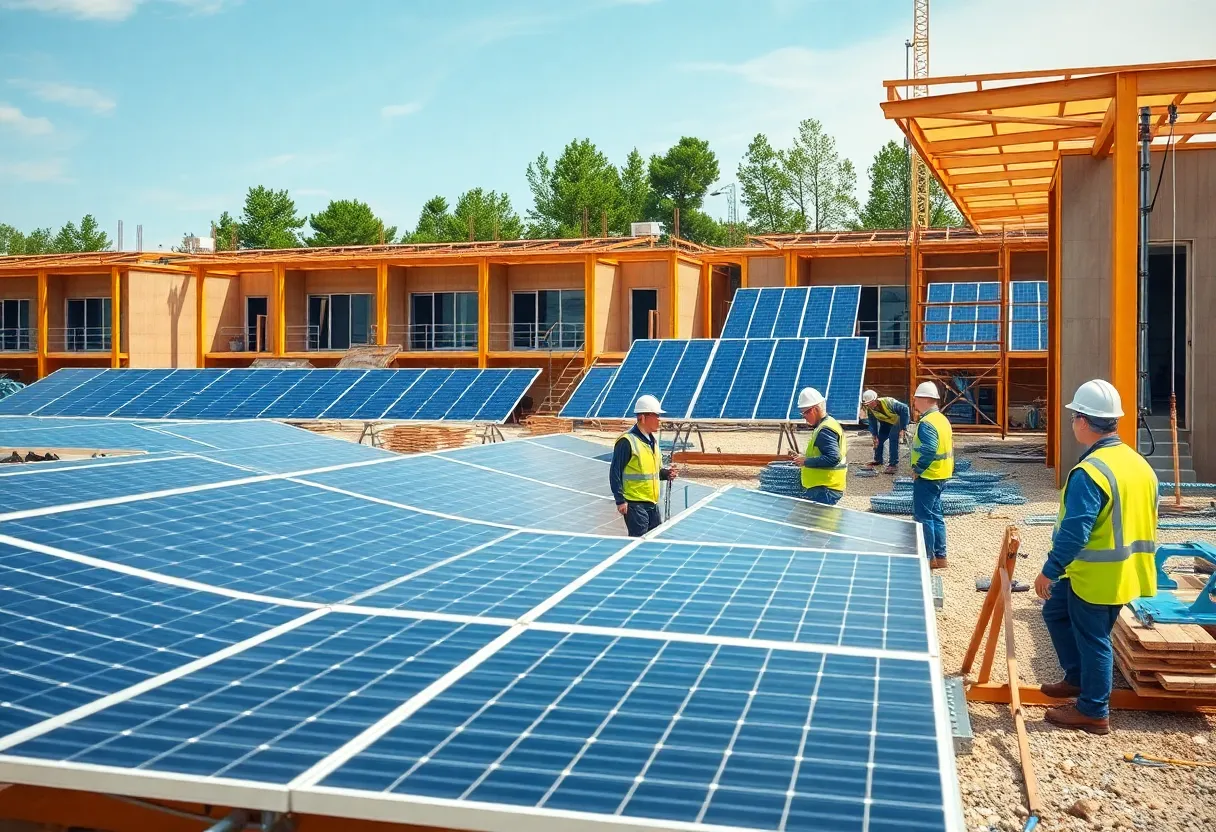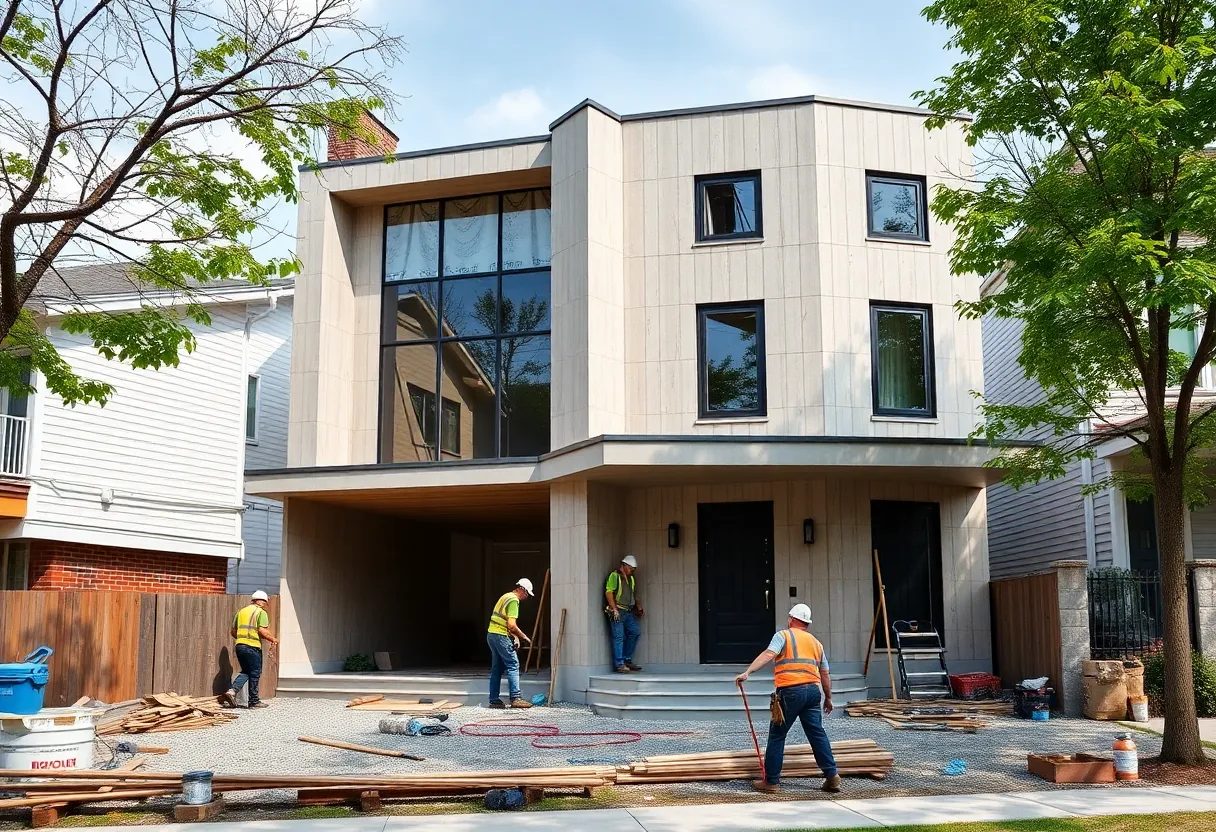News Summary
The construction sector is grappling with challenges like tariff fluctuations, outdated technology use, and opposition to renewable energy projects. As companies adapt, they revise contracts to mitigate financial risks and explore innovative construction methods like modular techniques. Meanwhile, major tech firms are investing in renewable energy to support their infrastructure growth. Community engagement and strategic planning are critical for navigating these complexities and ensuring successful project delivery.
Construction Sector Faces Multiple Challenges Amid Evolving Industry Dynamics
Major developments across the construction industry reveal significant hurdles related to tariff fluctuations, technological adaptation issues, and the complexities of renewable energy projects. The implications of these factors are shaping project planning, contract management, and community engagement strategies across the United States.
Impact of Tariff Volatility on Construction Contracts
Construction companies nationwide are encountering rising uncertainties due to fluctuating tariffs on essential building materials such as lumber, steel, and copper, as well as renewable energy components. These fluctuations have prompted industry professionals to revise standard contract terms to include provisions like price escalation clauses and force majeure clauses. These contractual adjustments are designed to mitigate financial risks that can lead to project delays or cost overruns.
Experts advise thorough review of construction agreements prior to signing to fully understand the potential impact of tariff changes. Material costs are a significant portion of construction budgets, making the prevention of unforeseen expenses critical for project viability and stakeholder confidence.
Technology Adoption and Challenges
Despite technological advances, a notable portion of construction professionals—approximately 27%—still rely on outdated tools such as email and spreadsheets for project management. This reliance can impede coordination, data accuracy, and timely decision-making, especially in complex projects like AI data centers or renewable energy installations.
For example, the development of large-scale AI data centers demands sophisticated planning and seamless integration of multiple construction disciplines. Outdated tools can hinder progress, risking delays and increased costs. Modern digital management platforms are increasingly recognized as essential for handling the complexity and scale of these projects.
Progress and Opposition in Renewable Energy Projects
Renewable energy projects continue to expand, with notable examples including the Frasier Solar project in Ohio, a 120 MW solar agrivoltaics development that recently overcame local opposition and misinformation campaigns to gain final approval from local authorities. Despite this success, opposition to solar farms has increased nationwide by 32% from 2023 to 2024, reflecting growing community concerns and environmental debates surrounding such developments.
Among the largest initiatives is a $900 million, 600 MW solar farm near San Antonio, Texas, which will supply electricity exclusively to Meta Platforms’ data centers under a long-term agreement starting in 2027. This demonstrates a rising trend where major tech companies are investing heavily in renewable energy sources to power their expanding data infrastructure.
Demand for renewable energy among technology giants is on the rise, with major acquisitions and investments by firms such as Meta, Amazon, and Google. These companies are prioritizing clean energy procurement to support their rapid data center growth and committed sustainability goals, including net-zero emissions targets by 2030.
Innovations in Construction Methods and Regulatory Environment
To meet ambitious timelines for higher education and other infrastructure projects, modular construction has emerged as an effective solution. Currently accounting for over 5% of the total construction activity in the U.S., modular techniques facilitate faster build cycles with minimal disruption to ongoing campus activities and community life.
Regional differences in permitting efficiency also influence project development. States like Florida, North Carolina, and Virginia are ranked among the top for permitting processes, helping streamline approval timelines. Conversely, states such as Pennsylvania and West Virginia lag behind, presenting hurdles for project execution.
Community resistance to large-scale developments remains a key issue. In Virginia, a grassroots movement successfully opposed the construction of a 2,200-acre gas-powered data center, reflecting increasing local pushback against large energy-intensive facilities, especially those associated with fossil fuels.
Data Center Growth and Community Concerns
Projected doubling or tripling of data center energy demand by 2028, driven primarily by artificial intelligence (AI) advancements, has intensified debates over site selection and community acceptance. The race to accommodate AI needs has led to controversial projects and conflicts with local residents and environmental groups.
Meta Platforms is pursuing several high-profile projects, including the Hyperion data center in Louisiana, targeting 5 gigawatts of computational power by 2030. Construction plans for Hyperion involve significant investments, including a $1.2 billion, 100-mile transmission project to ensure adequate power supply. Additionally, Meta plans to develop another advanced AI data center in Ohio, known as Prometheus, slated to become operational by 2026 and designed specifically for training large AI models.
Meta’s commitment extends to renewable energy, with recent agreements with Invenergy boosting its clean energy procurement to approximately 1,800 MW across Ohio, Arkansas, and Texas. These efforts are aligned with Meta’s goal to achieve net-zero emissions by 2030, although they have attracted scrutiny regarding environmental impacts and economic effects on local communities.
Conclusion
The evolving construction landscape in the United States highlights the need for adaptive strategies to manage tariff risks, adopt innovative construction practices, and navigate social and environmental challenges associated with renewable energy and data infrastructure. As industry stakeholders respond to these pressures, careful planning and community engagement will be vital for successful project delivery and sustainable growth.
Deeper Dive: News & Info About This Topic
HERE Resources
Economic Concerns Rise in Washington, D.C. Region
D.C. Schools Roll Out Safety Measures Amid Enforcement Surge
Construction Activity Continues in Altadena as Tariff Exclusions Are Considered
Back-to-School Anxiety Amid Federal Law Enforcement Surge
Missouri Experiences Record Construction Activity
Logan County School Board Approves Nickel Tax for New School
Kyrene School District Plans to Close Nine Schools
Texas A&M University Invests in Campus Infrastructure with Tuition Freeze
School District Cancels Classes Due to Bus Driver Shortage
Washington High School Football Rankings Released
Additional Resources
- JD Supra: The Site Report – Construction Industry
- Wikipedia: Construction Industry
- ESG Today: Meta Secures Nearly 800 MW of Renewable Energy
- Google Search: Renewable Energy Construction
- Dispatch: Data Center Project in Ohio
- Google Scholar: Data Centers Construction
- Carbon Credits: Meta Powers U.S. Data Centers
- Encyclopedia Britannica: Data Centers
Author: STAFF HERE WASHINGTON DC
The WASHINGTON DC STAFF WRITER represents the experienced team at HEREWashingtonDC.com, your go-to source for actionable local news and information in Washington, DC, and beyond. Specializing in "news you can use," we cover essential topics like product reviews for personal and business needs, local business directories, politics, real estate trends, neighborhood insights, and regional news affecting the area—with deep expertise drawn from years of dedicated reporting and strong community input, including local press releases and business updates. We deliver top reporting on high-value events such as the National Cherry Blossom Festival, Kennedy Center Honors, and the Washington Auto Show. Our coverage extends to key organizations like the Greater Washington Board of Trade and Destination DC, plus leading businesses in government contracting and technology that power the local economy such as Lockheed Martin and Amazon. As part of the broader HERE network, we provide comprehensive, credible insights into the dynamic landscape of the Washington metropolitan area.




